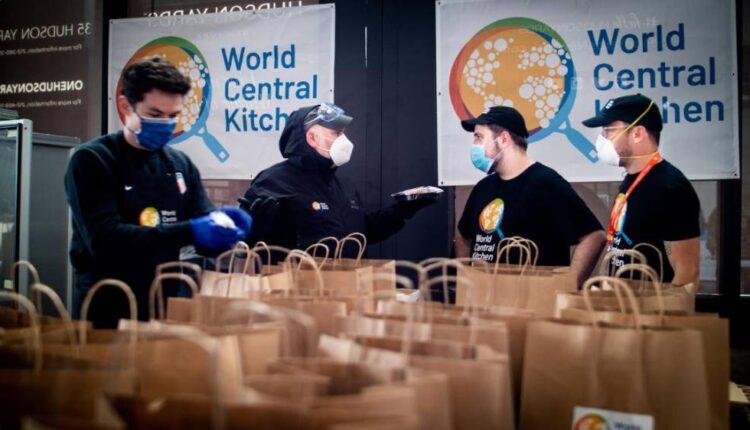Award-winning chef José Andrés is no stranger to disaster zones.
Over the past few years, he’s responded to several major crises. After an earthquake devastated Haiti, Hurricane Maria ravaged Puerto Rico, wildfires scorched Southern California, and a refugee crisis intensified on the Venezuelan border, he quickly mobilized volunteer chefs in each of those spots to prepare meals for thousands of people in need.Now, during the global coronavirus pandemic, Andrés is again leading the charge to provide food relief to the elderly, those suddenly without work and frontline health care and essential workers.
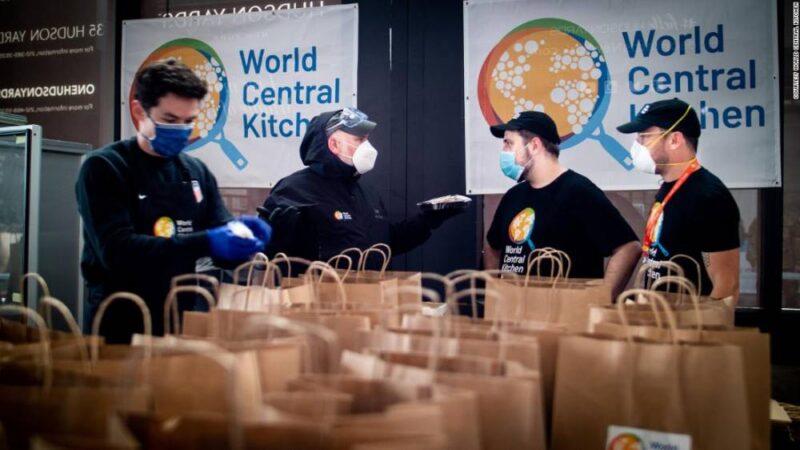
Chef José Andrés with the World Central Kitchen team handling the Covid-19 response in Hudson Yards, New York, in April 2020. (Courtesy World Central Kitchen)He was early to spring into action. His nonprofit World Central Kitchen (WCK) set up makeshift kitchens at the ports in Japan and California to feed quarantined cruise ship passengers and crew in February and even turned the Nationals baseball stadium in Washington, DC into a field kitchen to cook and distribute free meals.In Arkansas, when schools closed down in response to the pandemic, WCK teamed up the Clinton Foundation to feed children who rely on school-provided meals.Read MoreAnd at a time when America’s restaurants have come to a near standstill, with about six million restaurant employees laid off or furloughed since the beginning of the coronavirus outbreak in the United States, Andrés is aiming to turn hundreds of restaurants and other locations into community kitchens.
A decorated chef whose innovative dining concepts have earned two Michelin stars, in his career Andrés has opened an award-winning group of restaurants, written a number of cookbooks and created a collection of Spanish-inspired food products that are supplied to wholesellers and retailers nationwide. He could have easily kept himself out of harm’s way. He’s had plenty of work to do just managing his for-profit restaurant empire. Instead, he’s put himself on the front lines of crises at personal risk to himself. It is a dramatic departure for a chef of his caliber and stature. Andrés could, like some of his peers, just worry about appealing to the broadest swath of people in the friendliest, least polarizing way. Instead he has taken time away from his business, and he has not worried about doing so in a way that can make him a political figure, criticizing President Trump and pushing for action on crises like hurricanes and the coronavirus.
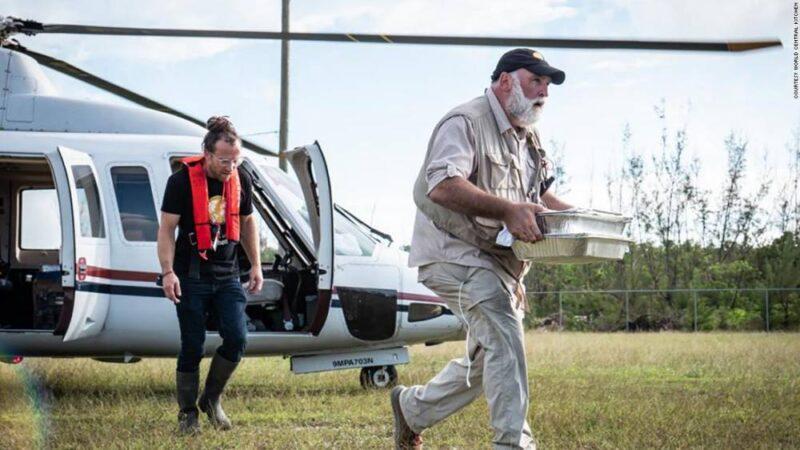
Chef José Andrés delivering food in the Bahamas following Hurricane Dorian in 2019. (Courtesy World Central Kitchen)Often it’s Andrés himself who leads the cadre of volunteer chefs, said Nate Mook, CEO of World Central Kitchen, the nonprofit emergency food-relief organization Andrés founded in 2010.”When there’s a medical crisis anywhere, we send doctors. So when there’s a food crisis, we send chefs to help,” he said.Andrés was on the ground with his team in Oakland, California overseeing food relief work for the cruise ship passengers; In New York City and in the DC area, he’s personally delivered meals and badly-needly personal protective equipment like masks and gowns to hospitals, shelters and senior centers amid the coronavirus pandemic.Related: See the 20 Risk Takers pushing global business forward“At the end of the day, José jumps in. We all jump in,” said Mook. “When someone is hungry, they aren’t hungry next week, or next month. They are hungry now.”
WCK has already delivered close to 18 million meals around the world thus far in places like Haiti, Puerto Rico, Indonesia, California and Mozambique. The non-profit is funded by individual donors, foundations and businesses. The organization logged $28.5 million in revenue in 2019.Now, as the world collectively faces an unprecedented situation with the novel virus having taken a foothold in more than 200 countries, and infecting over 3.5 million people in a matter of months, Andrés again is all in.
Mobilizing chefs on the front lines
In early February, 712 passengers and crew were quarantined aboard the Diamond Princess cruise ship that docked in Yokohoma, Japan. Nearly half of the people on board eventually tested positive for the virus.Within days of the ship’s lockdown, WCK and its chef relief team had mobilized to set up a field kitchen at the port, outside of the ship, to heat up and deliver fresh meals daily to quarantined passengers.
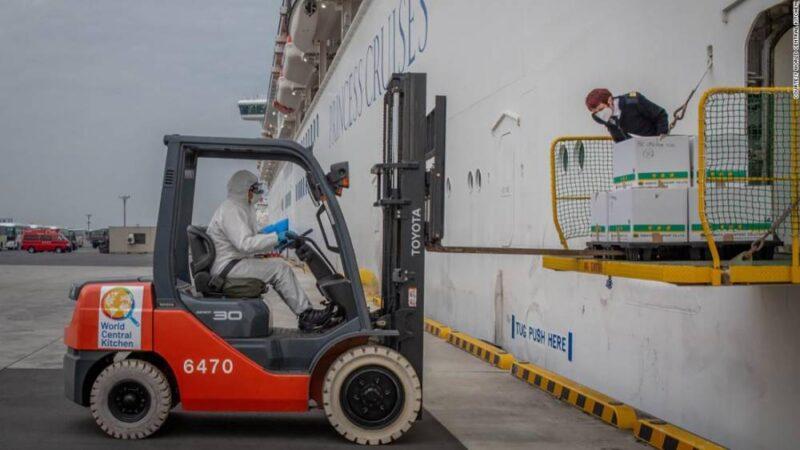
World Central Kitchen delivers meals to the Diamond Princess cruise ship in Yokohama, Japan during the coronavirus pandemic crisis. (Courtesy World Central Kitchen)”We got a lot of help from different Japanese chefs,” Andrés explained to CNN during a global town hall event in early March. “Everything was done in a very professional way to make sure that everybody will be safe, achieving what we wanted — feed everybody in a healthy way,” he said.Mobilizing local chefs and restaurants is key to quickly activating WCK’s operations in a crisis area, explained Mook. “Tapping into the local resources — chefs, kitchens, materials — rather than flying everyone and everything in, helps us rapidly scale our emergency efforts.” In April, WCK assembled another chef relief team to feed passengers and crew quarantined aboard a cruise ship in Oakland, California.Then, as the pandemic spread in the United States, shuttering businesses, closing schools and bringing life to a standstill, Andrés ramped up food relief efforts not only for frontline health and other essential workers, but also the many families now struggling to put food on the table.
In New York City, the epicenter of the nation’s outbreak, Andrés has turned his sprawling 35,000-square-foot food hall Mercado Little Spain, which encompasses three full-service restaurants and over a dozen food and retail kiosks, into a community kitchen serving low-cost (or free) grab-and-go meals to people in need. Over 3 million have been served in 890 individual locations to date, which includes but is not limited to community kitchens.In mid April, Andrés’ friend Jacques Torres, a New York City resident and one of the most renowned chocolatiers and pastry chefs in the world, witnessed the scale of the effort. “I was in the kitchen in Little Spain and there were thousands of little trays filled with food for people on the front lines,” said Torres. “It was humbling to see.”The volunteer chefs, united under the #ChefsForAmerica banner, are distributing 100,000 meals a day in New York City and in New Jersey, said Mook. WCK has served over 7 million meals distributed in 234 cities to more than 35 states and territories, as well as 35 towns and cities in Spain.The non-profit, in partnership with Bloomberg Philanthropies, is also providing meals specifically to NYC healthcare workers.
From humble beginnings
Torres has known Andrés for almost a decade.
“He’s one of the best chefs in America, the crème de la crème,” said Torres. “He’s a masterful technician in the kitchen. It’s in his blood. But what’s even more important is the deep respect he has for food, for farmers who grow food and the impact of food on our lives.”As it often happens with chefs who earn distinctive mastery of their craft, Andrés, now 50, began cooking as a young boy.”I began cooking when I was 15,” he said. “I owe it to my mom and dad.”He grew up in a small neighborhood on the outskirts of Barcelona, Spain in a middle class family. Both of his parents were nurses. “I began falling in love with cooking by watching my mom and dad,” said Andrés.Daily meals were cooked at home out of necessity. “They did it because we couldn’t go out everyday to eat. Going to a restaurant was a very special thing. At most [we] did it once a month,” he said.And when the family did go out, it would be to a little restaurant attached to a gas station. “Every gas station in the old days had a restaurant,” he said.For Andrés, it was the meals prepared at home with vegetables, chicken and fish and served with bread bought fresh every day that he enjoyed the most. “For me this was enjoyment.”He delighted in how his mother would find culinary tricks to make the monthly groceries last a little longer, “little leftovers of chicken chopped down and she would bread it and fry it.” “I didn’t know [at the time] that my mom did this because there was nothing else left at home at the end of the month,” said Andrés. “But that was my favorite dish.”Today, Andrés himself has numerous accolades to his name. He’s parlayed his talent into a vast food business empire led by his company ThinkFoodGroup. It oversees 29 restaurants in 9 cities across the world across the world, successful cookbooks and cooking shows.
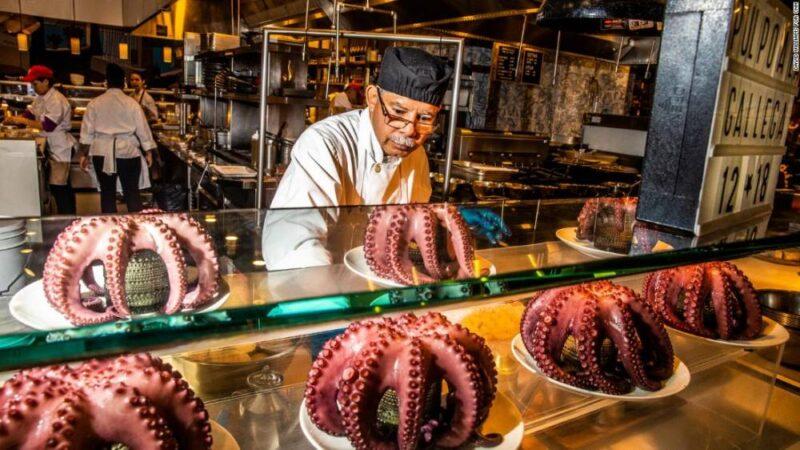
A chef working at Mercado Little Spain in Hudson Yards, New York on December 5, 2019. (David Williams for CNN)Now, a naturalized US citizen, Andrés is candid about what his coming to America story has meant to him — and how it’s changed him.”2019 is the 30th anniversary of the first time I came to New York,” said Andrés, who undertook the voyage aboard a naval ship. At one time, Andrés served in the Spanish Navy as an admiral’s chef.”America always gives big opportunity to immigrants like me, to share with the rest of America who we are. In my case, [I’m doing it] through food,” he said.
‘One plate of food can change the life of others’
Just as Andrés was attracting professional fame in the early 1990s — his restaurants celebrating Spanish gastronomy were generating buzz and he was winning prestigious awards — the chef who rose from humble beginnings felt a different yearning.Andrés became involved with DC Central Kitchen, a charity fighting hunger and poverty through job training and job creation.”It’s an amazing organization founded by Robert Egger,” said Andrés. “DC Central Kitchen is where we’re training people to be cooks, finding them jobs in their community, and feeding the homeless population of DC.”Volunteering there afforded him the chance to appreciate food in a more nuanced way.”We shouldn’t be here to feel good because we do something [for ourselves] but to see what we are doing to change the lives of others,” he said. “It’s a simple way of trying to see the world. In my case it was that one plate of food can change the lives of others.”His work with DC Central Kitchen made him wonder if he could use its blueprint on a global scale. “This is working so well in DC. If we take it to the world, what will happen?” he thought.As he pondered the idea, his attention was diverted by a catastrophic earthquake that struck Haiti in 2010. The scale of the disaster and the humanitarian crisis was hard to ignore and Andrés headed to Haiti in 2010 to help. The earthquake displaced over a million people. Haiti suffered widespread food shortages as food prices shot up. The United Nations estimated that 1.9 million Haitians did not have enough to eat in the aftermath of the earthquake, according to the UN.”In Haiti, Jose saw how a natural disaster can make access to food one of the biggest challenges,” said Mook. “It’s where he realized that food should be a solution, not a problem.”
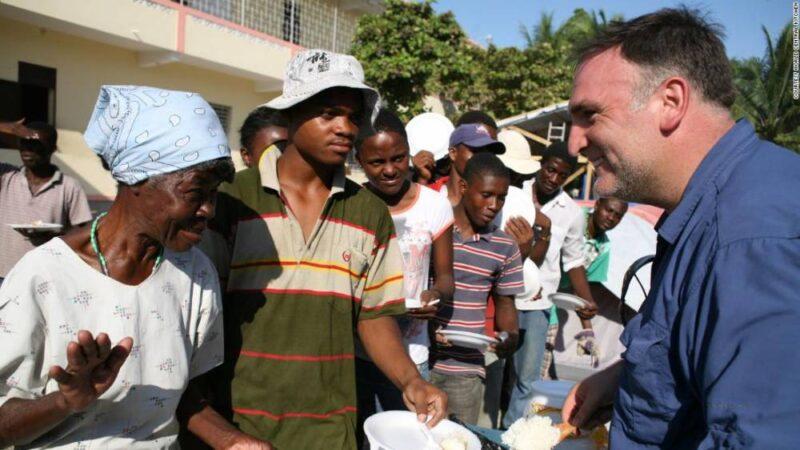
Chef José Andrés in Haiti in 2010. (Courtesy World Central Kitchen)That same year, Andrés founded World Central Kitchen. “We started small, from feeding 1,000 people a day to 2,000. Year after year, we gained more confidence, learning and watching,” said Andrés. “If you have an emergency [and] you need to feed people, why aren’t chefs there on the front lines? That’s how WCF was created.”The organization provided four million emergency meals combined after Hurricane Harvey cleared through Houston and Hurricane Maria blasted Puerto Rico in 2017.”To Jose, there’s a lot more to food than just sustenance,” said Mook. “To him, food nourishes the soul in time of crisis.” It can also provide badly-needed income to people in the community.”In Haiti, we started a bakery in an orphanage. It produced bread that generated money to reinvest back into the orphanage,” said Mook. Now, during the shutdown in the US, WCK has contracted with shuttered restaurants to help prepare 1 million relief meals, in turn providing them with a crucial economic lifeline. WCK is paying participating restaurants owners $10 per relief meal. Mook said the effort is designed to help get restaurants back on their feet and prevent many from going out of business. Health and safety protocols are mandated for everyone involved in the effort with restaurant staff advised to wear face masks, gloves and hair nets, and food preparation stations required to be at least six feet apart.Andrés’ own company ThinkFoodGroup has also taken a hit amid the shutdown. The business was able to keep all of its employees on payroll with full compensation during the first five weeks of the shutdown.But in late April, the company furloughed its hourly employees and made them aware of their unemployment benefits. ThinkFoodGroup said it is covering 100% of employee health benefit premiums while they are not actively working. “This pertains to employees in DC, NY, Las Vegas and Orlando. TFG continues to pay chefs and restaurants managers responsible for operating the community kitchens,” the company said.
‘I will always speak against things that are unfair’
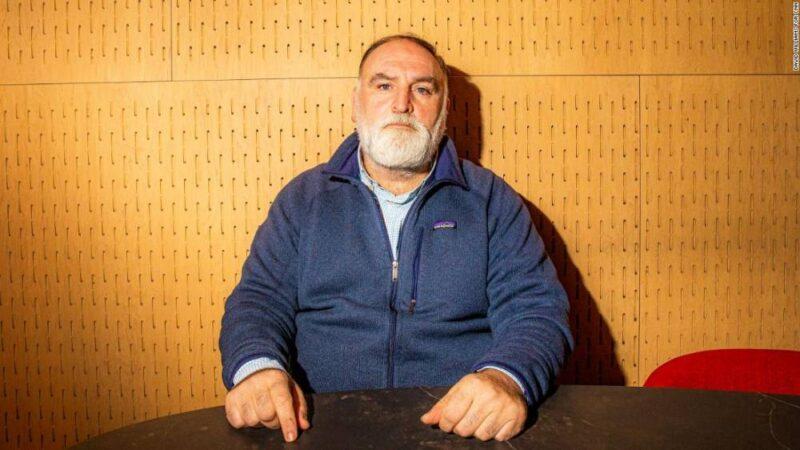
Chef José Andrés photographed at Leña, one of his restaurants at Mercado Little Spain in Hudson Yards, New York on December 5, 2019. (David Williams for CNN)As he reflects on his personal evolution from chef to dedicated humanitarian wanting to feed people at their most vulnerable, Andrés has courted risk along the way, particularly with his activism as a proud and successful immigrant.”It was very clear to me the day I swore in as an American, that we need to participate in the democratic process,” said Andrés.In 2015, Andrés backed out of a plan to open up a restaurant in the lobby of the Trump International Hotel in Washington after Trump called undocumented Mexican immigrants “rapists” and “criminals” during his bid for president.It locked Andrés in a legal battle with the President of the United States, which he settled in 2017. He’s also been vocal on Twitter with his criticism of the administration’s policy on immigration.”When you feel sometimes that things are unfair and unjust, I do believe it’s the role of every American to speak up,” said Andrés. “The smart thing for America to do once and for all, is to pass immigration reform.”Torres admires his friend’s activism and how he’s standing up for his beliefs, more so now than ever.”When you are a celebrity chef, you realize you have a platform to have your voice heard. Jose is doing an amazing job with that,” said Torres. “No doubt, Jose is one of the best chefs. But what he is doing as a humanitarian is even bigger. I hope other chefs pick up the flame and keep it going.”
Source: edition.cnn.com

